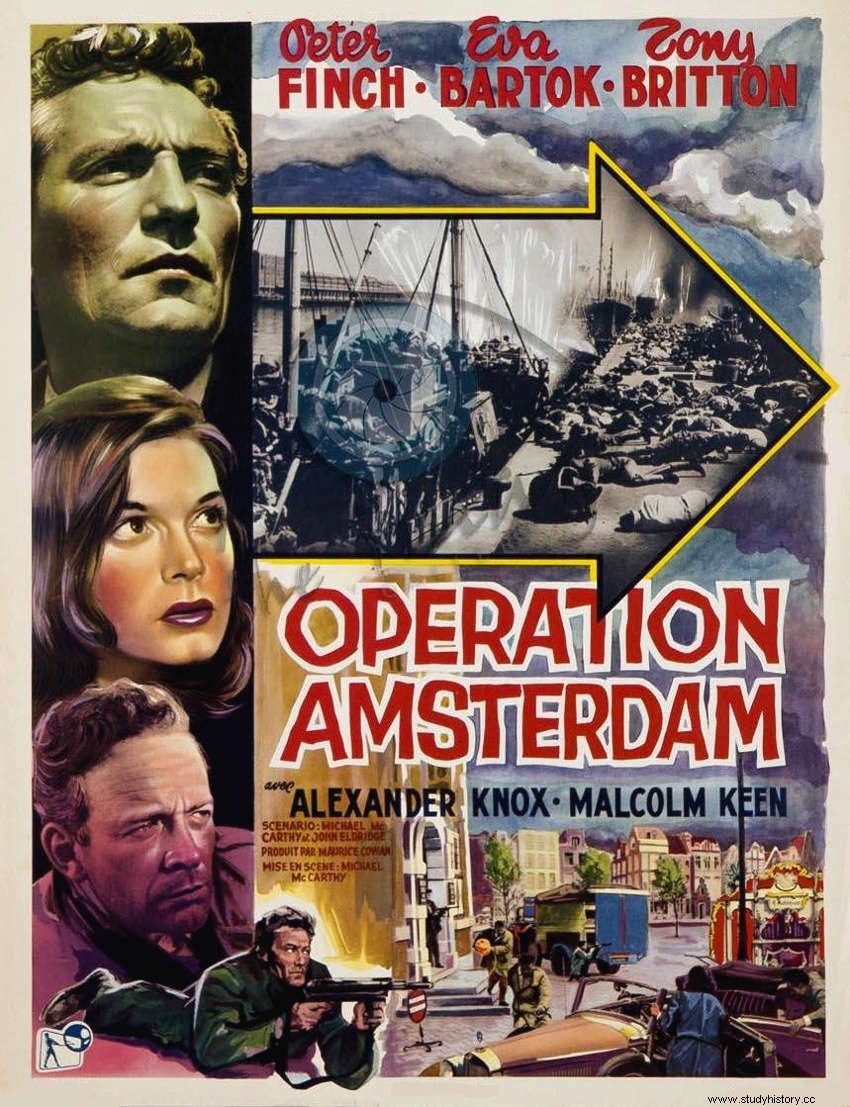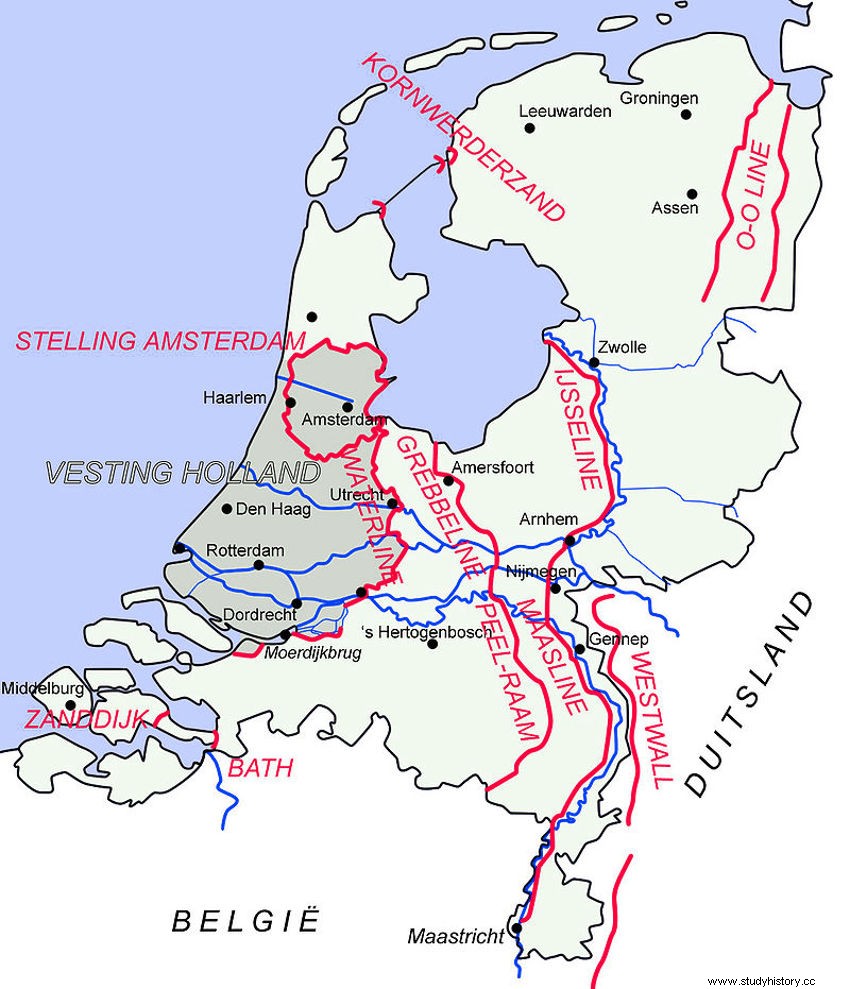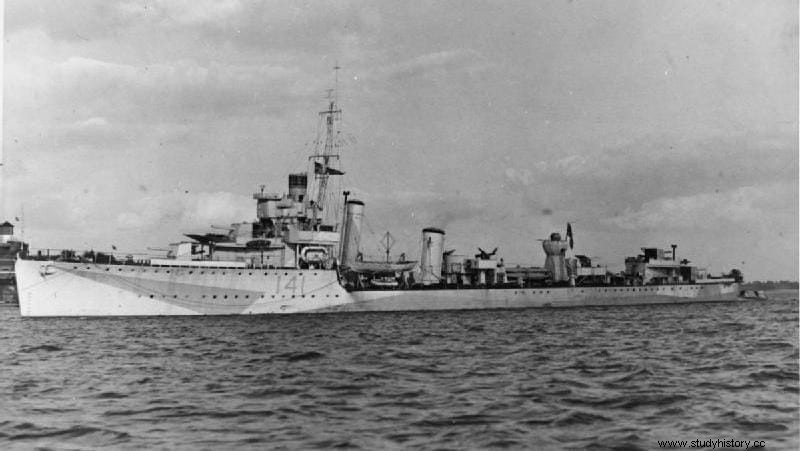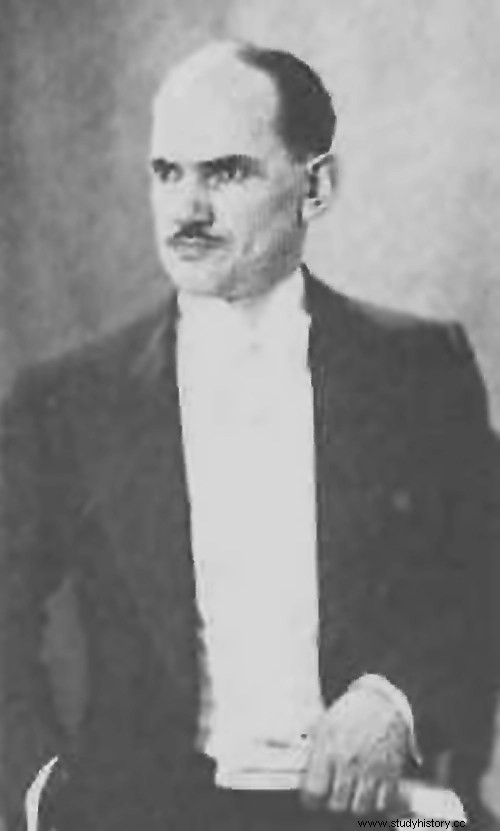In 1959 London hosted the premiere of one of those films about World War II that were so abundant in the decades after it.
Of British production, it was titled Operation Amsterdam (here in Spain it was changed to The Robbery of the Century) and was directed by Michael McCarthy, a minor filmmaker who perhaps signed his best work with her.
Starring Peter Finch, it is the adaptation of David Walker's book Adventure in diamonds , which recounts a little-known episode that occurred during the German invasion of the Netherlands:an operation to take away the diamonds that was in the Dutch capital before the enemy did.

In the film, those in charge of carrying out the mission are a gem expert, a secret service agent and an army major.
The three corresponded to the trio that really starred in the events:William Woltman , a Dutch expert gemologist based in England; Jan Smits Kor , noted diamond dealer, and Montague Reany Chidson , aka Monty , an artillery lieutenant colonel who was in command of the operation.
Monty He had fought as an aviator in the First World War. , in which he was taken prisoner and returned as a hero. In 1940, already forty-eight years old, he enjoyed a peaceful destiny as military attache of the British embassy in the Netherlands because he knew the country well, since his wife was of that nationality. But on the morning of Friday, May 10 of that year, things changed radically when the Wehrmacht started the invasion.

Although Norway and Denmark had already fallen, the Dutch thought that Hitler would respect his neutrality , declared precisely because they are aware of his military inability to stop a hypothetical attack.
Thus, the only defense was based on the traditional Water Line and its complement, the Grebbe Line , both conceptually obsolete because they consisted of opening the dikes that close the passage to the polders (land reclaimed from the sea) and flooding the fields, as in the time of the Tercios, avoiding that the paratroopers they could overcome that obstacle; that's how it happened.
Despite the fact that the Germans sent their weakest troops to the Netherlands, the 18th Army , composed of four divisions and another three inexperienced reserves and therefore reinforced with several SS divisions, Holland was occupied in just one week while the Royal Family was evacuated to England.
And yet, there was no lack of warnings of the danger . Some German commanders, upset with the idea of attacking a country that was not only neutral but had supported them in the previous war, secretly sent notices of what was being prepared.
Monty he was one of those who were informed because, after all, it was his job:he was a military attaché, yes, but as that position used to imply, he was also part of MI6 , the overseas section of the British intelligence service, which he had joined from MI5 (the section that operated in Britain).
Monty he was in The Hague when the news of the invasion broke and his presence was immediately demanded in London. Once there, he was asked to urgently devise a plan to take the as many diamonds as possible from Amsterdam. industrial, which were stored in the Dutch capital.
Keep in mind that it was not called the City of Diamonds because if; It had been the world's largest center of trade and carving for four centuries of those precious stones and, given that this business was fundamentally in the hands of the Jewish community , it seemed predictable that the Nazis would take it away.
As there was no time to waste, on Saturday night the destroyer HMS Walpole she led the trio of agents to the mainland, where they transferred to a fishing boat that left them at a dock.
The ship would come back for them in fourteen hours; that was the meager time they had to get the loot and get to safety. They got a car and arrived in Amsterdam, where a state of war had been declared and the Germans were expected to show up shortly.

In a hurry, they established contact like the Hebrews and they presented the situation to them:they had to move their merchandise to England as soon as possible or they would lose it. It was not easy to convince them because some, somewhat naively, believed that this was their only chance to negotiate with the Nazis , without counting the possible reprisals that they took against them when they saw that the diamonds were no longer there. However, the commando was given access to the main market so that they could enter and take as much as they could.
Unfortunately, it turned out that most of the merchandise was not there but in a bank vault . Still, they decided to try their luck.

Helped by people from the Dutch resistance, who apparently had already organized their first nuclei given the scene that was coming (the local Nazi groups already ruled the streets), they entered the building and reached said chamber, finding that it had a delayed opening system that it would not allow access to the boxes until Monday. Too long to wait, so they started trying combinations to try and open it.
However, the task dragged on and went on for nearly twenty-four hours and only the information collected by the Dutch collaborators allowed them, finally, to have a free hand and empty as many boxes as they could.
Then Monty and his companions fled and somehow reached England , it is unclear if aboard HMS Waldpole -that he would have gone looking for them despite exceeding the agreed deadline- or on his own.
The booty, if you can call it that, was given to Queen Wilhelmina and the government of it. The exact amount of diamonds they stole, as well as their value, is unknown, although some consider that it could be the greatest robbery in history of that product.
What was official was the granting of the Distinguished Service Order to Montague Reaney Chidson, as published in the London Gazette (something like the British BOE) little more than a month later, on December 20, 1940, for the courage shown in France and Flanders.
Monty His participation in the Second World War did not end there, since in 1943 he was assigned to the embassy in Turkey as head of security. In that mission he was not so fine, because the ambassador's butler turned out to be Elyesa Bazna , better known by the codename Cicero , one of the most active spies available to the Germans in that conflict, to whom he provided photographs of dozens of documents.
Ironically, one could say that, after all, the Monty was not to guarantee security but precisely the opposite, and he went down in history as the best robber at the service of her Majesty.
